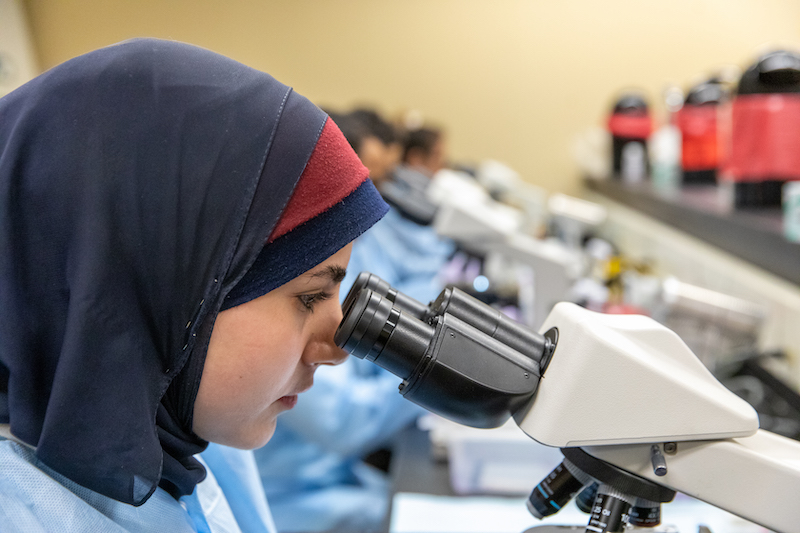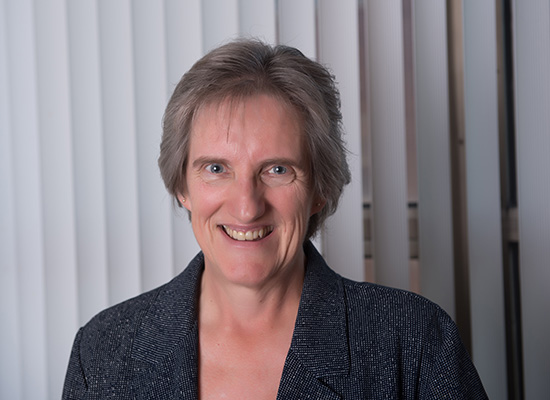Clinical Laboratory Science program changes name to Medical Laboratory Science

More than 70 percent of medical diagnoses are informed by lab results from blood glucose and CBC to urinalysis. Examining those specimens using high-tech instrumentation are medical laboratory scientists, who provide doctors with critical information nobody else can see.
To better reflect the importance of this role in medicine, and to evolve with industry-standard language, the Wayne State University Eugene Applebaum College of Pharmacy and Health Sciences Clinical Laboratory Science program has changed its name to Medical Laboratory Science. The university's Board of Governors voted to approve the new name at its March 8, 2023, meeting.

"We may be hidden away in windowless labs, but our profession is truly at the core of modern medicine," said Program Director Karen Apolloni. "Not a lot of people know what happens to their blood when it is drawn for labs, but they definitely know the value of the results. There's a person between those two events that holds the key to a patient's diagnosis and treatment."
Beginning in fall 2023, students in the program will graduate with a Bachelor of Science in Medical Laboratory Science. The curriculum will remain the same; however, all courses labeled CLS will now be listed as MLS.
The need for medical lab scientists is growing fast, at a projected increase of 16% over the next decade. And Wayne State grads are ready. Students spend the last 22 weeks of the program earning clinical experience through full-time, 40-hour-per-week internships at world-class hospitals in Detroit and throughout Michigan. It's no wonder alumni have achieved a 100% job placement rate for as long as Apolloni can remember, with many students having multiple offers before they even earn a diploma.
Students are often drawn to the program after being inspired in general education courses. For 2022 grad Nydia Andrade, it happened during an Intro to Microbiology bodily fluids laboratory. "I just fell in love with all the instruments and being in a laboratory," she said. "I remember looking at urate crystals under the microscope; it was the most interesting feeling, seeing things that I did not know existed."
Established in 1936 and accredited by the National Accrediting Agency for Clinical Laboratory Sciences (NAACLS), the Wayne State CLS/MLS program recently added a departmental honors track to challenge and encourage students to develop research projects and explore course content in greater depth.
"A medical lab science bachelor's degree can put you right into a high-demand job, or it can be a great stepping stone toward medical school," Apolloni said. "Our students tend to like to stay in the lab, in the background, but there are a lot of ways for them to shine."
About us
The bachelor of science in Clinical/Medical Laboratory Science is offered through Wayne State's Eugene Applebaum College of Pharmacy and Health Sciences with an application deadline of May 1. Medical laboratory scientists work behind the scenes to provide critical information to doctors through medical tests. In fact, lab results inform more than 70% of diagnoses, allowing doctors to tailor treatment plans and therapies to each patient. Medical laboratory scientists may also pursue careers in medical information systems technology, research and design new testing methods, or go on to medical school.
An anchor in urban health care
The Eugene Applebaum College of Pharmacy and Health Sciences is built on more than 100 years of tradition and innovation in the heart of Detroit. We have grown deep roots in our city, harnessing its powerhouse hospital systems and community service organizations as vibrant, real-world training grounds for students, with an ongoing focus on social justice in health care. And our research at all levels - from undergraduates to veteran faculty members - translates into creative solutions for healthier communities.
Wayne State University is a premier urban research institution offering approximately 350 academic programs through 13 schools and colleges to nearly 24,000 students.